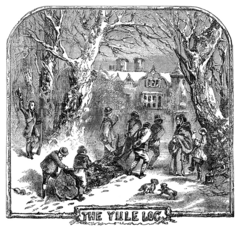耶鲁节
耶鲁节(或译作尤尔节)是由古代日耳曼民族所庆祝的宗教节日,后来接受基督教化后改为庆祝更为著名的圣诞节,所以耶鲁节对于他们来说相当于是圣诞节的前身。“耶鲁”一词最早出现于日耳曼民族所用的月份名称,例如ÆrraJéola(耶鲁前),或ÆfteraJéola(耶鲁后)等等。学者认为这节日是为了连庆祝野生狩猎节、北欧神奥丁和盎格鲁-撒克逊异教的夜间母神节。[1]
| 耶鲁节 | |
|---|---|
 1832年耶鲁节里人们在运送耶鲁树 | |
| 别名 | Yuletide、Yulefest |
| 参与者 | 多个北欧国家、新异教、一神普救派 |
| 类型 | 文化节日、日耳曼异教与随后的基督教、民俗节日、新异教主义 |
| 频率 | 每年 |
| 相关节日 | 冬至、圣诞节节期、季度结账日、年度之轮、冬季庆典、圣诞节 |
另见
编辑资料来源
编辑- ^ Guðbrandur Vigfússon (1874:326).
参考文献
编辑- Barnhart, Robert K. (1995). The Barnhart Concise Dictionary of Etymology. Harper Collins. ISBN 0062700847
- Bosworth, Joseph; Toller, T. Northcote (1898). An Anglo-Saxon Dictionary. Oxford: Oxford University Press.
- Faulkes, Anthony (Trans.) (1995). Edda. Everyman. ISBN 0-460-87616-3.
- Guðbrandur Vigfússon (1874). An Icelandic-English Dictionary: Based on the Ms. Collections of the Late Richard Cleasby. Clarendon Press.
- Hoad, T. F. (1996). The Concise Oxford Dictionary of English Etymology. Oxford: Oxford University Press. ISBN 0-19-283098-8.
- Hollander, M. Lee (Trans.) (2007). Heimskringla: History of the Kings of Norway. University of Texas Press. ISBN 978-0-292-73061-8
- Orchard, Andy (1997). Dictionary of Norse Myth and Legend. Cassell. ISBN 0-304-34520-2.
- Orel, Vladimir (2003). A Handbook of Germanic Etymology. Leiden: Brill Publishers. pg. 205. ISBN 90-04-12875-1.
- Simek, Rudolf (2007) translated by Angela Hall. Dictionary of Northern Mythology. D.S. Brewer ISBN 0-85991-513-1